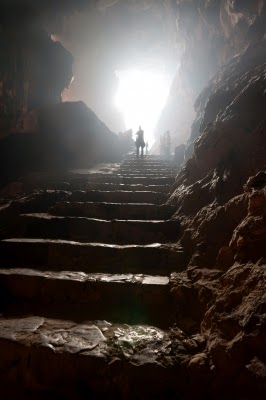Christ Comes Down: Mark 9:2-8 - Transfiguration Sunday
 |
| Photo courtesy of papajia2008 / freedigitalphotos.net |
I absolutely despise
air travel. If it weren’t for the sheer
speed and convenience of it, I’d never set foot on an airplane again.
Why? Because the more
budget-conscious you are, the more the airline feels entitled to treat you like
cattle. They cram you into a tiny seat
in the back of the plane, with barely enough room even to yawn. Naturally, you’re the last to get off the
plane—but you’re also the last the board it if you didn’t pay for priority
boarding.
There’s no place like a commercial jet where you can feel so
low while flying so high…
First class, on the other hand, is the glory life,
right? You’re on top of the plane and on
top of the world. There’s a reason why
we love to climb mountains, and why you’ll pay top dollar for a Mt. Washington
property overlooking Pittsburgh or “a deluxe apartment in the sky.”
Being on top is more than just success; it’s rising above
the struggle and hurly burly of the world below. It is the ascent to glory.
Peter, James, and John knew this the day Jesus took them up
to a mountaintop—and they saw Jesus radiating with the glory of God, as he
spoke with Moses and Elijah who’d miraculously appeared out of nowhere. In this moment, there’s no room for doubt
that Jesus truly was the Messiah they’d been waiting for. And it created the very reasonable
expectation that Jesus would be returning to the world below as a conquering
king who’d destroy the brutal Roman regime and restore Israel to its glory of
old. This was the start of something big.
Then comes the voice from heaven: “This is my Beloved
Son. Listen to him!” And then it’s all over! Jesus leads them back down into a world that
was pretty much the same as it was before, save for one thing: Jesus told them
before, and he’ll be telling them again—that he is going to die. Following Jesus is no glory ride to the high
life.
And from a common-sense perspective, that makes no
sense. We often speak of faith as
“rising above” all the pains and struggles of life—which would be fine and good
if faith drove all our problems away.
But it doesn’t. Sometimes, faith
only adds to the confusion and disillusionment that comes a major trauma in our
life. We ask God, “why?” “What’s going to happen?” But we don’t get any answers.
But the Transfiguration event teaches us one of the most
important truths about who Jesus is: he is God, leaving behind the power and
glory of the mountaintop and his dazzling-white laundry to come into the depths
of our human experience. Jesus goes down
to bring light into our darkness.
And what does he do in our darkness?
·
He forgives sins and
sinners—including his executioners
·
He becomes one with the
poor and forgotten
·
He showers the sick and
dying with compassionate mercy
·
He overturns injustice and
oppression to create peace
·
He gives us life for the
sake of all.
We come into the light of Jesus by doing exactly what the
voice from heaven tells the disciples to do: we listen to Jesus. His Gospel illuminates the darkness of our
reality so that we can see Christ by faith.
Yet we don’t just see with our ears.
We see with our whole bodies as his life washes over us in baptism. We see with our mouths as we eat and drink
his body and blood. We see him in the
hands, feet, and faces of ourselves and one another as draws us together as one
body to heal this broken and weary world.
Granted, we will have mountaintop experiences in our lives
when we see Jesus in miraculous acts that defy all other explanation. But we’ll spend most of our lives in the
depths. We don’t have to call pain and
suffering “good,” but it is in them that God’s amazing grace firmly takes hold. God is glorified as Christ delivers us from
the darkness.
Wednesday, we begin the forty-day journey of Lent. “Lent” comes from an Anglo-Saxon word meaning
“springtime,” to be a time of planting and growth. (This is almost ironic, considering the fact
that we carry such a bleak perception of the season.) But in order for there to be growth, there
must be light. That light is Jesus,
coming into the darkest places of our lives to turn us from sin and form us
into his faith, hope, and love. We can
live in freedom from fear to death, evil, and all the pains of life—because
when they strike, Jesus will bring us his resurrection. That’s where the power of Christ bursts
forth: cross and tomb. It is from those
very depths that we will rise by the grace of God, from death into life.


Comments
Post a Comment